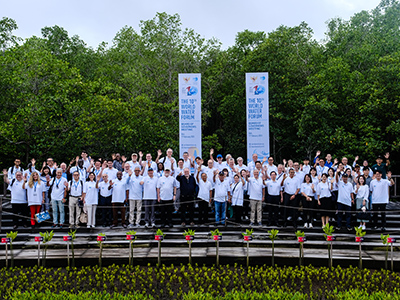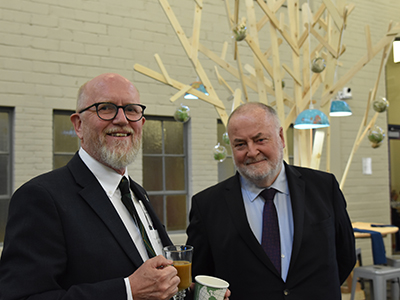McCornick and Neale re-elected to World Water Council, DWFI involved in World Water Forum

Credit: World Water Council
The 9th General Assembly of the World Water Council (WWC) re-elected DWFI Executive Director Peter McCornick to the council’s board of governors during its meeting in Paris in December 2022. DWFI Director of Research Christopher Neale was re-elected as an alternate.
McCornick and Neale were elected for their first term in 2018 and again in 2022, as the planned 2021 election was delayed a year due to the pandemic.
DWFI is one of just four U.S.-based institutions in the Professional Associations and Academics college. The institute has actively participated in the World Water Council’s World Water Forums, the largest international event on water, held every three years in different international locations to advance water management and sustainability. DWFI co-led the Water for Food track of the World Water Forum held in Brasilia, Brazil, in March 2018.

Credit: ZimmComm
McCornick has been appointed to the Forum Bureau, the high-level committee directing the preparations for the 10th World Water Forum to be held in Bali, Indonesia, in May of 2024. McCornick and Neale both participated in the first planning meeting for the forum in Jakarta earlier this year andDWFI is supporting the development of the program for the upcoming forum.
“We continue to collaborate with our partners to bring the link between agriculture, food and water to the forefront of the world stage,” said McCornick.
The World Water Council is an international multi-stakeholder organizationcreated in 1996 to gather the international community to convince decision-makers that water is essential for the sustainable and equitable development of the planet.
During his keynote address at the Water for Food Global Conference, which was designated as a partner event to the 10th World Water Forum, the President of the World Water Council, Loïc Fauchon, stressed that “we must stop ignoring that water is food.” In his video message to the conference, Minister Basuki Hadimuljono, Ministry of Public Works and Housing, Republic of Indonesia, encouraged attendees to “develop new initiatives and collaborative actions for water for food security” and, on behalf of the government of Indonesia, extended an invitation to attendees to bring these ideas to the 10th World Water Forum in Bali.
About the World Water Council
The World Water Council has 260 member organizations, which come from 52 countries across 5 continents and represent five Council colleges:
- Intergovernmental institutions
- Governments and Governmental Authorities
- Enterprises and Facilities,
- Civil Society and Water Users Associations
- Professional Associations and Academics
Together, World Water Council members bring a spirit of community around one goal: Making water a global priority. To do this, the council focuses its activities around three main areas:
- Mobilizing stakeholders and hydrodiplomacy
- Promoting water security, and
- Organizing the World Water Forum
The decision-making body of the organization is the Board of Governors, 35 members who are elected every three years by the General Assembly.
FY 2023 Annual Report
- Overview
- Introduction
-
Research and Policy
-
Global
- Brazilian agricultural state looks to Nebraska and DWFI to sustainably manage water resources
- Irrigation equipment ownership not always best for smallholder farmers
- McCornick and Neale re-elected to World Water Council, DWFI involved in preparations for the World Water Forum
- Understanding the agtech ecosystem in India can spur future investments
-
Regional + National
- DAWN Project testing its decision-support tools with corn and soybean growers
- Water Center director helps City of Lincoln find second water source
- Water, Climate and Health program makes an impact in Nebraska
- DWFI's flux tower network now helps validate carbon credits
- Understanding climate’s effect on the health of Americans
- Groundwater transfer success stories guide water managers in meeting local water needs
- Advancements in crop modeling help adapt to climate change
-
Global
-
Education
- Faculty Fellows
-
Supported Students
- DWFI funds eight new students working on mission-related projects
- DWFI continues support of Platte Basin Timelapse interns
- Estimation of manure nutrient capacity in Nebraska minimizes water quality impacts
- Could cover crops replace offset in-season corn fertilizer?
- Congratulations to DWFI-supported student graduates
-
Communication
- Digital and online engagement connects DWFI with its global audience
- Coverage of DWFI research and events reaches more than 219 million people
- Creative storytelling used to amplify DWFI smallholder irrigation research outputs
- DWFI expertise tapped for national reports and publications
- DWFI staff receive well-deserved recognition
- 2022 Nebraska Water Center Annual Report now available
-
Outreach and Events
- Global Conference draws international audience to address water and food security
- On-farm event in Western Nebraska strengthens partnerships, spurs new ideas
- Engagement recovers to pre-pandemic levels
- Drought at forefront of discussions at Platte River Basin Conference
- 49th Annual Water Tour broadens knowledge about Nebraska water
- Nebraska Water Center seminars focus on hot topics in Nebraska Water
- Development
- Resources
- Search
FY 2023 Annual Report
- Overview
- Introduction
-
Research and Policy
-
Global
- Brazilian agricultural state looks to Nebraska and DWFI to sustainably manage water resources
- Irrigation equipment ownership not always best for smallholder farmers
- McCornick and Neale re-elected to World Water Council, DWFI involved in preparations for the World Water Forum
- Understanding the agtech ecosystem in India can spur future investments
-
Regional + National
- DAWN Project testing its decision-support tools with corn and soybean growers
- Water Center director helps City of Lincoln find second water source
- Water, Climate and Health program makes an impact in Nebraska
- DWFI's flux tower network now helps validate carbon credits
- Understanding climate’s effect on the health of Americans
- Groundwater transfer success stories guide water managers in meeting local water needs
- Advancements in crop modeling help adapt to climate change
-
Global
-
Education
- Faculty Fellows
-
Supported Students
- DWFI funds eight new students working on mission-related projects
- DWFI continues support of Platte Basin Timelapse interns
- Estimation of manure nutrient capacity in Nebraska minimizes water quality impacts
- Could cover crops replace offset in-season corn fertilizer?
- Congratulations to DWFI-supported student graduates
-
Communication
- Digital and online engagement connects DWFI with its global audience
- Coverage of DWFI research and events reaches more than 219 million people
- Creative storytelling used to amplify DWFI smallholder irrigation research outputs
- DWFI expertise tapped for national reports and publications
- DWFI staff receive well-deserved recognition
- 2022 Nebraska Water Center Annual Report now available
-
Outreach and Events
- Global Conference draws international audience to address water and food security
- On-farm event in Western Nebraska strengthens partnerships, spurs new ideas
- Engagement recovers to pre-pandemic levels
- Drought at forefront of discussions at Platte River Basin Conference
- 49th Annual Water Tour broadens knowledge about Nebraska water
- Nebraska Water Center seminars focus on hot topics in Nebraska Water
- Development
- Resources
- Search
Top image caption
McCornick and Neale participated in the first planning meeting for the World Water Forum in Jakarta, Indonesia in February 2023.
Credit: World Water Council
Related Articles
Digital and online engagement connects DWFI with its global audience
The Water for Food Podcast continues to be a successful initiative with each new episode averaging over 1,000 downloads.
2022 Nebraska Water Center Annual Report now available
The Nebraska Water Center’s 2022 annual report is now available. This report highlights the research, outreach, and training done to support the Water Center’s mission in 2022.
Coverage of DWFI research and events reaches more than 219 million people
Coverage of DWFI research, announcements and events in various external media outlets over the past year earned the institute a reach of more than 219 million views through 255 media mentions.
COOKIE USAGE:
The University of Nebraska System uses cookies to give you the best online experience. By clicking "I Agree" and/or continuing to use this website without adjusting your browser settings, you accept the use of cookies.

